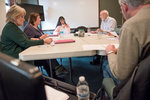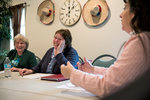


Nearly two decades ago, Bob Hansen, of Onalaska, sat down with pen and spiral notebook and plunked out his first novel in 10 months.
“I thought it was great, but I realized that others might have a different opinion,” he said.
He sent the draft to an acquaintance.
“This was the critical point. If she liked it, I’d be on my way,” Hansen said. “If, by some chance, she didn’t like it (that could never happen), I would cast aside my spiral notebook for good. A sad thing to contemplate.”
Fortunately for Hansen, and Chronicle readers who enjoyed his 250 humor columns for five years until October 2004, she responded positively.
“It’s true that what she said, ‘This part needs a little rework,’ might have meant ‘This paper needs to be recycled into wood pulp,’ but she was kind in her critique. And thus my illustrious career was off and running.”
Shortly afterward, he saw a blurb in The Chronicle: “Anyone interested in a writers’ group?” Hansen responded, and The Inklings writers’ critique group has been meeting every week for the past 18 years. Members share 1,500 to 2,000 words of their writing each week.
Joyce Scott, who lived in Chehalis for more than 33 years and winters in Arizona, said several people attended a writing class taught by a professional author, “and when that class ended, we kept going.”
Carolyn Bickel, of Chehalis, responded to the same newspaper notice.
“I knew nothing about the so-called rules of writing, such as ‘point of view,’ but soon learned by making mistakes,” Bickel said. “I enjoyed the challenge and stuck with it.”
Receiving critiques isn’t much fun, especially at first.
“It hurts to hear that something you’ve toiled over for hours still needs work,” said Scott, who described “humble pie” as a staple on the meeting menu. “But if you grit your teeth and accept the criticism, you grow in your craft and learn to appreciate the discipline.”
The critique group succeeds for several reasons, Scott said. They practice the sandwich technique of critique — giving encouragement, suggesting improvements, and ending with what they liked. Members have come and gone, but most persevered. And all believe in God, who gave them the gift to write.
“The critique group was my teacher,” said Bickel, who has completed two novels. “We have lasted so long because of our positive input. And we like each other. I consider them friends.”
“I learned more through critique groups than any other thing,” Hansen said. “To listen to others as they gave their opinions, I was forced to work on improvement of my own.”
Twelve years ago, Kyle Pratt, of Napavine, joined the group after hearing about it from a friend at church. He gave the informal critique group its moniker, The Inklings, after a British literary group that included great writers such as C.S. Lewis and J.R.R. Tolkien.
“I go to several groups and just saying ‘I’m going to the group now … no, the other one,’ made it sound like an AA meeting and got to be cumbersome,” Pratt said.
After finishing her first novel in 2007, Barbara Tifft Blakey, of Olympia, joined a group closer to home, but members offered encouragement rather than critique. A secular group didn’t fit her either. “My face still flushes at the language I heard!”
She met Hansen at the Oregon Christian Writers summer coaching conference in August 2007 and submitted writing samples to the group.
“I claim love at first sight,” she said. “It was exactly what I needed, and through the guidance of the group my first novel “Bertie’s War” was released by Kregel in April of 2009.”
The combination of truth and encouragement provides a perfect blend for learning.
“I continue coming because we sincerely care about each other’s work in a personal way,” Blakey said. “At one level, I consider their stories my story too.”
“Far too many writers try to do it all on their own,” said Debby Lee, of Centralia, who joined in June 2014 and writes Christian romance, historical and suspense novels. She joined to obtain the wise counsel of other writers.
“The group has honesty with kindness,” said Kristie Kandoll, of Winlock, who joined after meeting Blakey at a 2014 OCW conference. “We point out strengths and weaknesses of each other’s work. Empty praise is worthless to writers — but harsh negativity destroys creativity.
“Writers are vulnerable — and I trust this group with my writing, my hopes and dreams. We are pulling for each other to succeed.”
They’ve had successes. Hansen’s “Why Can’t Women Understand Men? We’re So Simple,” was released in 2002 and “A Bully’s Doom” in 2007.
Scott, who has written fantasy-allegory, historical fiction, a fairytale and murder mysteries, has published seven books on Amazon. “I now write murder mysteries exclusively and am having more fun than any human should be allowed to have.”
Pratt, who writes post-apocalyptic and speculative science fiction, has independently published four full-length novels, with plans to release three more this year. He also published two novellas, a novelette and several short stories.
And, after making a study of “indie publishing,” he’ll be teaching two workshops on the topic at the Southwest Washington Writers Conference Sept. 9 at Centralia College. Lee will teach a workshop there on writing anthologies after contributing novellas to six anthologies. Blakey and Lee both contributed to “Hearts of the Pony Express,” which releases in April.
“When one of us sells a ton of books (Kyle), I feel part of his success, not in a way of taking credit for it, but in the joy of his accomplishment,” Blakey said. “When one of us gets a book contract (Debby), I am through the roof! When one of us meets with rejection or receives nasty comments in a rejection letter or from a judge in a contest, my heart aches as if those comments are directed at me.”
“I’m not jealous or envious if another member gets a book published — I’m happy for them,” Pratt said.
Each writer brings strengths and expertise to the group.
Scott is the “queen” of point of view. Bickel the encourager. Pratt pushes for more action and tension. Hansen, a poetic writer, guides the group and offers wisdom. Kandoll shares practical and down-to-earth grammar and fact-checking, while Lee urges inclusion of romance and adverbs.
“I contribute what I can, but I always come away having received more than I give,” Blakey said.
•••
Julie McDonald, a personal historian from Toledo, may be reached at memoirs@chaptersoflife.com.